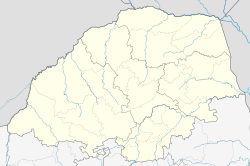Sekgakgapeng
|
Mokopane Potgietersrus |
|
|---|---|
|
|
|
| Coordinates: 24°11′2″S 29°0′46″E / 24.18389°S 29.01278°ECoordinates: 24°11′2″S 29°0′46″E / 24.18389°S 29.01278°E | |
| Country | South Africa |
| Province | Limpopo |
| District | Waterberg |
| Municipality | Mogalakwena |
| Established | 1907 |
| Area | |
| • Total | 75.13 km2 (29.01 sq mi) |
| Elevation | 1,130 m (3,710 ft) |
| Population (2011) | |
| • Total | 30,151 |
| • Density | 400/km2 (1,000/sq mi) |
| Racial makeup (2011) | |
| • Black African | 66.7% |
| • Coloured | 0.7% |
| • Indian/Asian | 4.4% |
| • White | 27.6% |
| • Other | 0.6% |
| First languages (2011) | |
| • Northern Sotho | 46.5% |
| • Afrikaans | 27.8% |
| • English | 7.4% |
| • Tsonga | 4.4% |
| • Other | 13.8% |
| Postal code (street) | 0600 |
| PO box | 0600 |
| Area code | +27 (0)15 |
Mokopane (officially renamed from Potgietersrus in 2003), is a town in the Limpopo province of South Africa. The village Vredenburg was established by the Voortrekkers and renamed Piet Potgietersrust after the slain Voortrekker leader Piet Potgieter. The name was changed to Mokopane in 2003 in honour of King Mgombane Kekana who resided on the land and ruled the area before he was overthrown and killed by the Voortrekkers.
Two hours from Gauteng by road, the town acts as a getaway destination and as a stop-over for travelers en route to Botswana, Zimbabwe and Kruger National Park. The area is typical bushveld with many acacia trees and aloes, which display their beautiful blooms in June and July.
The historic and archaeologically significant Makapansgat caves are situated 15 km north of the town. Recovery of Homo habilis habitation has been made at these caves. Remains of Australopithecus africanus have also been found at the caves. The Arend Dieperink Museum portrays the history of the town, from the ape-man at Makapansgat, Bushmen paintings and early activities in the area up to the South African War and recent times.
The stunning bushveld environment and influences from Northern Sotho, Ndebele, Tsonga, SeSotho, Afrikaans and English cultures give Mokopane a unique character. There are also ancient caves, the "Big Five", San rock paintings, curios, bushveld food and drinks such as biltong (dried meat) and mampoer (a potent alcoholic drink), tropical gardens and traditional dancing. In the adjacent township of Mahwelereng traditional lifestyles, set against the spectacular Waterberg, can be observed. Mokopane also offers outdoor activities ranging from hiking, camping and 4 × 4 trails to birding, angling and game viewing.
...
Wikipedia



